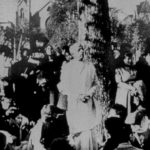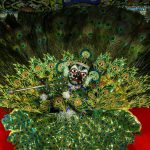"Complete knowing is the knowledge that is inherent in love. When one loves, one knows what to do. When one loves God, one knows everything one needs to know."
Q. Over the years I have come back to Krsna, each time learning progressively more; however, I never seem to be able to cross the threshold from intellectual understanding to actual belief. It's like there is a battle going on within between the side of me that longs to believe and the side that has doubts. Does the fact that I can't seem to get beyond my doubts mean that the path of Krsna consciousness is not for me? Do all devotees have doubts?
A. The fact that you have doubts about Krsna consciousness does not necessarily mean that the path is not for you. Bhagavad-gita (7.19) tells us that it takes lifetimes to assimilate the knowledge that impels one to fully surrender to Krsna. Unlike scholastic achievement, the knowledge spoken of here is that which is born of a sincere hankering for truth. Such sincerity is ever victorious, says Bhagavad-gita (6.40).
Your diligent efforts to understand Krsna consciousness, returning to it again and again over the years, speaks volumes as to your sincerity and desire to make progress on the path. The Gita encourages scriptural study, calling it worship of Krsna with the intelligence, and promises that those who fully embrace devotional practice as revealed in the text will be blessed with realization that overcomes all doubt. I discuss this point in my commentary to Bg. 7.1:
"The Lord of Sri said: Listen O Partha, how with mind attached to me, practicing yoga and taking refuge in me, you can know me completely without doubt.
"Having concluded the sixth chapter by emphasizing devotion to himself, Krsna continues speaking about devotion as the seventh chapter opens. While knowledge of the self (tvam, you) is revealed in the first six chapters, knowledge of that with which the self is to be united in love (tat, his) is revealed in chapters seven through twelve. Thus the famous Upanisadic dictum tat tvam asi, 'you are his,' is explained.
"When Krsna told Arjuna to fix his mind on him, Arjuna naturally wondered how one does so. Sensing his mental question, Krsna speaks without waiting for Arjuna to ask, enthused to be speaking directly about devotion, by which he can be known completely. In the previous six chapters, knowledge of the individual spiritual self's likeness to Brahman and the nature of the Brahman and Paramatma feature of the Absolute have been described. Now in this chapter, Krsna will discuss the Bhagavan feature of Godhead.
"Bhagavan is the personal, lovable aspect of Godhead, replete with eternal form, abode, associates, and pastimes. Reality exists, is cognizant of itself, and has a purpose. As Brahman, Godhead exists. As Paramatma, cognizance comes into play, and as Bhagavan, a cognizant existence plays. This play, the inner life of the Absolute, is the lila of Bhagavan, which overflows into the world of our experience from time to time when Bhagavan enters this plane. Knowing this feature of Godhead amounts to knowing him completely (samagram).
"Knowledge of Bhagavan, which includes all of his saktis, is required if one is to practice the devotional yoga Krsna characterized as the best of all at the end of the previous chapter. His primary sakti was introduced in the fourth chapter (Bg. 4.6). His intermediate and secondary saktis are introduced in this chapter.
"Complete (samagram) knowing is the knowledge that is inherent in love. When one loves, one knows what to do. When one loves God, one knows everything one needs to know. This knowing is characterized further as freeing one from doubt (asamsayam). Doubt is a function of the mind. When it is overridden, we are able to move freely. Intellect driven movement suggests surety, yet following its lead amounts to proceeding with caution. It is not the movement of the heart. Here Krsna speaks of the homeland of the heart, and a life in which mind and intellect are subordinate to one's heart. In this land, one does not doubt the virtue of serving God, but questions how one can serve him best in any given circumstance.
"How does one reach this plane? One begins by hearing, indicated here by the words tat srnu. Krsna says further, yogam yunjan, one attains comprehensive knowing in love through yoga practice. Devotional yoga has three developmental stages: devotion in practice (sadhana-bhakti), devotion in ecstasy (bhava-bhakti), and devotion in love (prema-bhakti). Here Krsna speaks of devotion in practice. He is speaking, however, of the final stage of sadhana-bhakti, invoking as he has the word asakti, spiritual attachment. Asakti is the stage of practice in which the practitioner's mind is attached to Krsna, the object of devotion (mayy asakta-manah). At this stage, due to intense attachment, one's spiritual identity is glimpsed as one enters devotion in ecstasy, taking refuge in Krsna alone."
[From Bhagavad Gita: Its Feeling and Philosophy: http://www.swami.org/pages/swami/books/gita.php]The scriptures tell us that devotees will experience various degrees of doubt up to the point that they develop a genuine taste for chanting. When one attains this stage of devotion, known as ruci (taste), the chanting that was previously medicine turns into the practitioner's food. Practitioners who have not attained ruci are advised to address doubt through association with advanced devotees who have attained a taste for chanting and to study the scriptural legacy of Gaudiya Vedanta under their guidance. Such association and study helps one control the mind and develop the spiritual intelligence necessary to attain steadiness in spiritual practice. Steady spiritual practice (nistha), is the prerequisite for attaining a genuine taste for chanting.
Our task is to move from the realm of doubt to the realm of faith to the realm of love, which is the true homeland of the heart. As much as our intelligence is wedded to our senses and thus serves to facilitate their gratification, doubt regarding the spiritual reality will predominate and genuine spiritual experience will be limited. In this unfortunate scenario, one lives primarily to exploit others and the natural environment, albeit to a large extent unknowingly. On the other hand, when intelligence is tied to spiritual practice in pursuit of transrational experience, the intelligence fosters transcendence of itself and consequently self-realization and freedom from doubt. In self-realization we experience not only that we exist, but also the extent to which we exist. This, then, is the end of fear, the end of doubt.
If God does exist, proof of this will not be found outside of spiritual practice, on terms other than those that God has ordained. In other words, the Absolute reveals itself to the sincere spiritual practitioner. In essence the heart of spiritual practice is giving. Through practical experience we know that by giving our consciousness expands, and by taking or exploiting it contracts. Our task, then, is to give unconditionally, and for this two things need to be in place. First of all we need to know where we can best repose our innate giving tendency. If we are to give without limit–to love–we must find the perfect object of love, or one who has the capacity to receive unlimitedly. Secondly, to give unlimitedly we must give without any ulterior motive. We must give without expectation of reward.
Scripture tells us that Krsna is the perfect object of love. Indeed, this is what we mean when we speak of Krsna. Once initial faith arises, we must begin our life of giving to the center (Krsna), however imperfectly with regard to our motivation. Gradually our capacity to give unconditionally will grow, as the present material conditions under which we find ourselves and by which we are presently limited are removed by God's grace. These conditions, arising from misidentification with matter, place us in apparent need and thus hamper our soul's capacity to give. By serving the center in a systematic way, as outlined in scripture, our false sense of need will gradually diminish, and to the extent that our present conditioning is transcended, we can truly love. In love secrets are revealed and one knows what otherwise could never be known. Love is the end of doubt.










